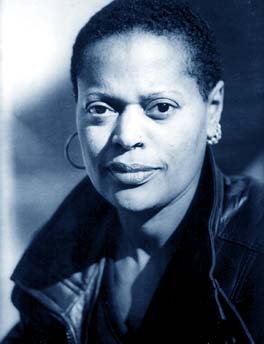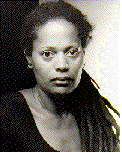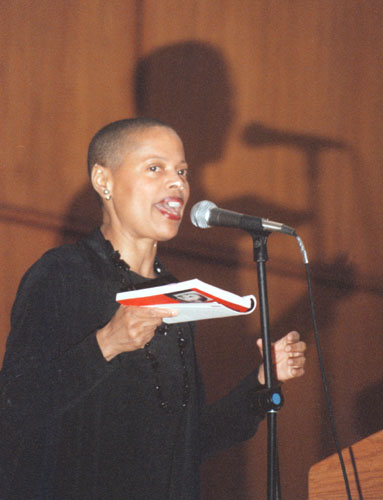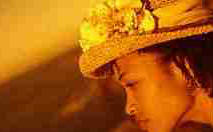








































 
Sapphire

Black Wings & Blind Angels: Poems

0679766758:Product Link on Barnes & Noble.com.
|
Sapphire
(Ramona Lofton)
Ramona Lofton, better known to her readers as
Sapphire, was born in 1950 in Fort Orr, California. On the
surface, her family was characterized as the normal, middle
class family. Her father was an army sergeant and her mother was
a member of the Women's Army Corps. As a child, Sapphire's
family relocated several time to various cities, states, and
countries. When she was only 13 years old, Sapphire's mother
became the victim of alcoholism and eventually departed from her
life. Her mother eventually died in 1983. In that same year, her
brother, who was then homeless was killed in a public park.
Sapphire attended San Francisco City College
in the 1970's majoring first in chemistry and then switching to
dance. She soon dropped out to become a hippie and moved to New
York in 1977 taking several odd jobs, including topless dancing
and housekeeping. It wasn't until the early 1980s that she began
writing poetry and reading it aloud at various Village venues
including the Nuyorican Cafe. Sapphire eventually returned to
school and graduated with honors in 1993 with a degree in modern
dance. Upon graduation, she taught reading to students in the
Bronx and Harlem and also enrolled in graduate school at
Brooklyn College.
Single-monikered literary icon Sapphire has
been called many names. A writer whose art grapples with diverse
identities and marginalized communities, she often finds herself
under attack, not least because she challenges the very groups
with which she identifies. She reminisces, "In the ’80s I’d be
in front of a black audience reading about a black woman eating
a white woman's pussy, and I was considered a deviant traitor."
At an event in Chicago, where she was billed as a lesbian
author, she faced the wrath of two female audience members
furious at what they considered to be Sapphire's deliberately
faux-lesbian performance. Seems her reading wasn't Sapphic
enough. But she doesn't flinch away from people who try to
simplify her particular mélange of identity and sociopolitics
with attempts to label and limit her scope. Expressing the
difficult locus where revelation meets revolution is her
signature fusion, a fierce combination of confessional and
political metamorphoses.
 Her
groundbreaking, autobiographical book of poetry American
Dreams (1994) probed the brutal legacy of childhood sexual
abuse, while her second book and debut novel, Push
(1996), ushered her into mainstream success and celebrity. The
critically acclaimed novel was a controversial examination of
the intersections of urban poverty, literacy, incest, and AIDS
in the life of protagonist Precious Jones, a teen mother
learning to read and finding autonomy despite desperate
circumstances. "I feel great about Push," she says.
"They're reading that book in Guadalupe. It's been translated
into French, which means in all of West Africa, there's the
possibility of it being a weapon against HIV and homophobia." Her
groundbreaking, autobiographical book of poetry American
Dreams (1994) probed the brutal legacy of childhood sexual
abuse, while her second book and debut novel, Push
(1996), ushered her into mainstream success and celebrity. The
critically acclaimed novel was a controversial examination of
the intersections of urban poverty, literacy, incest, and AIDS
in the life of protagonist Precious Jones, a teen mother
learning to read and finding autonomy despite desperate
circumstances. "I feel great about Push," she says.
"They're reading that book in Guadalupe. It's been translated
into French, which means in all of West Africa, there's the
possibility of it being a weapon against HIV and homophobia."
Sapphire is following Push with a book of poetry,
Black Wings & Blind Angels (Knopf, 130 pp., $20), keeping
her poetic voice limber. "To me," she says, "poetry is like a
language, a language I want to keep up." Here, her
characteristic intensity mixes with classical as well as
experimental forms, excavating dreams, memory, and history to
address a multitude of topics, police brutality and sexual
identity among them. In quieter moments she gracefully examines
the fear of making love with the lights on, meditating on the
eroticism of a body not in its idealized youthful form. Even in
Black Wings's more harrowing poems, sestinas abound,
lending a sharp, disciplined edge to unwieldy memories of
childhood abandonment and rape.
This engagement with formal poetics marks a significant change
of perspective for Sapphire. Forgiving her sexually abusive late
father after decades of rage, she's offering themes beyond her
personal-healing manifestos. "Healing is a good state," she
says, "but it's also all-consuming. Somewhere past healing you
get what they promise you, you get your life back. You get to
explore other things. It's like that Buddhist aphorism, 'The
barn has burnt down and now I can see the moon.' "
 Moving
past the work of survival, she says, and linking it to political
realities outside one's personal scope, is critical for social
change. In Black Wings, Sapphire takes aim at American
institutions that effectively sanction racist violence. A series
of poems, "Gorilla in the Mist," which was begun in
American Dreams and continues in the new volume, explores
paradoxical constructions of black male sexuality as much as it
does police brutality, graphically imagining the psyches of
racist cops. In another poem, "Looking at Plate No. 4: 'Homicide
Body of John Rodgers, 883 W. 134th Street, Christensen, October
21, 1915,' " she muses on a real-life episode described in
Luc Sante's Evidence, in which a murdered black man was
photographed with his penis exposed, a post-mortem indignity
that would not have been inflicted on a white victim. Moving
past the work of survival, she says, and linking it to political
realities outside one's personal scope, is critical for social
change. In Black Wings, Sapphire takes aim at American
institutions that effectively sanction racist violence. A series
of poems, "Gorilla in the Mist," which was begun in
American Dreams and continues in the new volume, explores
paradoxical constructions of black male sexuality as much as it
does police brutality, graphically imagining the psyches of
racist cops. In another poem, "Looking at Plate No. 4: 'Homicide
Body of John Rodgers, 883 W. 134th Street, Christensen, October
21, 1915,' " she muses on a real-life episode described in
Luc Sante's Evidence, in which a murdered black man was
photographed with his penis exposed, a post-mortem indignity
that would not have been inflicted on a white victim.
For Sapphire, forgiving her father was a crucial step in being
able to address the complex range of social injustices facing
African American men. In a long prose poem, "My Father Meets
God (or, The Dream of Forgiveness)," she portrays her father
meeting God in the afterlife, recalling pivotal points of his
life in a fluttery stream-of-consciousness. Regarding Sapphire,
the father in the poem feels a mixture of pride for what she's
made of herself ("Look at your girl lift up the people; she's
the nurse, teacher (poet/healer) you always wanted her to be")
and regret for how he hurt her. Ultimately, the daughter's
strength redeems the father: "Look look see Sapphire shine. She
changed it for you, the past. That's what children are for."
Sapphire knows the past is not entirely changeable, but that it
can be transcended and transformed. Known for years as an out
lesbian feminist, Sapphire has, in her new book, revealed her
bisexuality. Following the poem "A Window Opens" is a rather
blunt and oddly stiff explanatory note about this change.
Shrugging off the label "lesbian" is certain to prove no easier
than shouldering it, but, as always, she is ready for the
discussion. "As much oppression as I took on when I came out as
a lesbian, the gay community was also a safe place for me. And
that was okay for a little while, but then that safety became a
box. I made a big statement when I came out, and since that
statement is no longer holding true, I need to make another
statement about where I'm really at." Sapphire's readers should
know by now that her work ruthlessly challenges accepted norms
and attitudes about women, sexuality, race, and politics. And
the poet knows her readers: "My audience includes people who can
or would like to understand the process of personal
transformation, people who understand putting yourself out
there. There are those who, whether or not they agree with where
I'm going, are serious about telling the truth about life and
therefore will be serious about me and my work."
Sapphire is hoping for a dialogue among women who are ruled by
desire, in part because the prevailing discussion of mutable
sexual identity seems too simplistic. "The world is not black or
white," she says, "the transgender movement is showing us that
it's not strictly male or female, there's a whole wilderness in
between." If separatist ideologies polarized and simplified
genders, Sapphire is excited by the possibilities for
multiplicity, pleasure, and inclusive sexual politics she sees
pulsing in younger feminists. She claims, "These women are gonna
have their sexualities, with men, with other women. I think
that's big progress."
Moving along herself, she wonders aloud whether these themes of
sexual identity will resurface in the novel she's working on.
"We'll see," she says. But one thing is for certain: "This is my
last public coming-out statement." Sapphire's last word can be
taken as the first word in the push-and-pull of a controversial
dialogue, possibly leading toward the kind of inclusiveness that
the poet herself insists on. As she says in "A Window Opens":
"It's about opening, being vulnerable, coming out front with my
desire, being clear after all these years."

 |
Source:
http://www.villagevoice.com/vls/164/shaughnessy.shtml
Voices From The Gap:
http://voices.cla.umn.edu/authors/sapphire.html
|
|
|

|
PRECIOUS WORDS - Sapphire speaks about Push
Interview by Darius Casey
Text by
The opening lines of Sapphire's Push
might not be music to some ears, but they ring true: "I was left
back when I was twelve because I had a baby for my fahver. That
was in 1983. I was out of school for a year. This gonna be my
second baby. My daughter got Down Sinder. She's retarded."
With about 150 pages of
jagged words like these, African-American poet, teacher and
novelist Sapphire burst on the modern literary scene, landing a
$500,000, 2-book deal with Knopf. Push centers on the writings
of Precious, a 16-year-old girl who, after enduring molestation
and violence by her parents, seeks a better life for herself
through education. The critics are split; some say Push is a
brilliant account of ghetto life, some say Precious is simply a
"stand-in for polemic" (Ellen Levy , City Pages). This is what
Sapphire says:
|
|

|